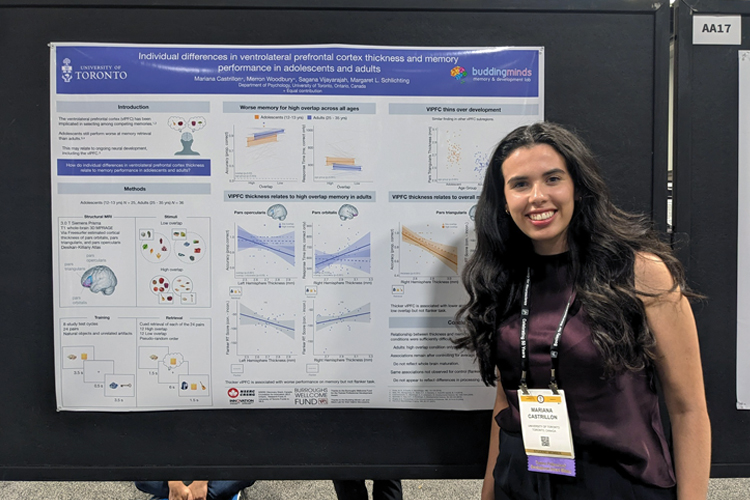Mariana Castrillon has been fascinated by the brain and people’s behaviour since she was young.
She chose the University of Toronto for its global reputation as a leader in research and innovation. She is now researching child and parental depression and how it influences the developmental origins of decision-making. The award-winning student, honoured with the Trinty College’s Claudia Morawetz Award in Student Leadership twice and the Chancellor William C. Graham Award, is graduating with her honours bachelor of science in the psychology research specialist program as a member of Trinity College this month before heading to Yale University where she will be working full-time as a researcher.
Castrillon spoke to Arts & Science News about her passion for research, experiences as a student and peer mentor and her favourite memories on campus.
Tell us more about your field of study.
I graduated from the psychology research specialist program — it's a small program in life sciences. There are only 12 other students graduating with me. It’s designed for students who want to complete a thesis, and there are research opportunities built into the program. In your third year, you complete what's called a mini-thesis, and that's an opportunity to get your first exposure to leading a project. Then you do an honours thesis in your fourth year. In both experiences, I created a strong relationship with the professors and graduate students in the labs.
What have been some of your meaningful experiences beyond the classroom?
I’ve been playing cello since I was seven years old. I work as a music teacher on the side — it provides me with a lot of satisfaction. While it’s separate from the University of Toronto, it supported my life as a student and kept me grounded even during the busiest weeks of the academic year.
Any advice you would give your first-year self?
From peers in your classes to your program, clubs or intramural teams, surround yourself with people that support your personal and professional growth and are central to you as a person.

There are so many communities and circles within the University of Toronto and coming into it, it can seem quite nerve-wracking. It's such a large and prominent institution with an abundance of different colleges and campuses, but there are established communities for you to discover and each allows you to build your own community within it.
And take care of yourself. It's important to prioritize your mental health as a student and find that balance between what works for you as an academic and as a person. University is a time to grow, but you don't necessarily have to find out who you are. That's a lot of pressure on someone's shoulders. By prioritizing your mental health, you inadvertently learn more about yourself.
Do you have any memorable experiences you’d like to share?
My acceptance into the Research Opportunities Program was extremely memorable. Through this program, I began working in a developmental cognitive neuroscience lab called the Budding Minds Lab led by Dr. Meg Schlichting in the psychology department. This was in the summer between my first and second year. I maintained my position in that lab for my whole degree. It felt so exciting to be part of a wonderful research team at such a strong research institution.
My work as a community adviser at Trinity College was also very meaningful. Witnessing the growth, personally and professionally, of the students you are supporting is incredibly rewarding. The college is like a second home to me. It’s something I really enjoyed and could never have predicted doing my first year. Now, I can't imagine my undergraduate degree without it. I really loved it.
What’s next?
Starting in the fall, I’ll be working as a researcher at Yale, investigating the effects of early adversity and how that impacts children and adolescents' development in terms of their brain, their behaviour and their resilience to future stressors.
I would love to be a professor. That's my ideal position, to have my own lab and be that mentor for future mentees, just like I've had the opportunities to be a mentee. When I reflect on some of my favourite classes, it's because of the professors and how they transformed the course content to be interesting and engaging for the students.

